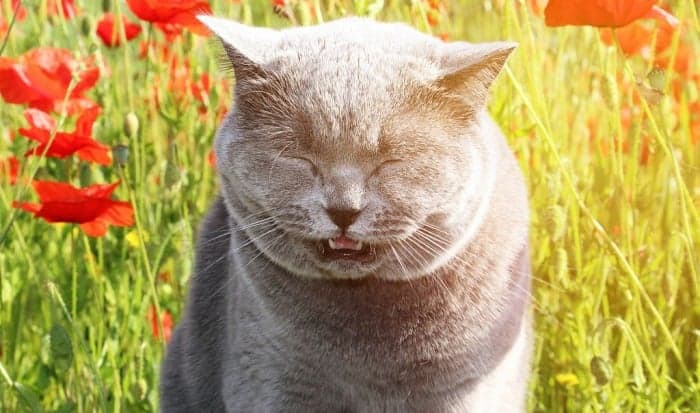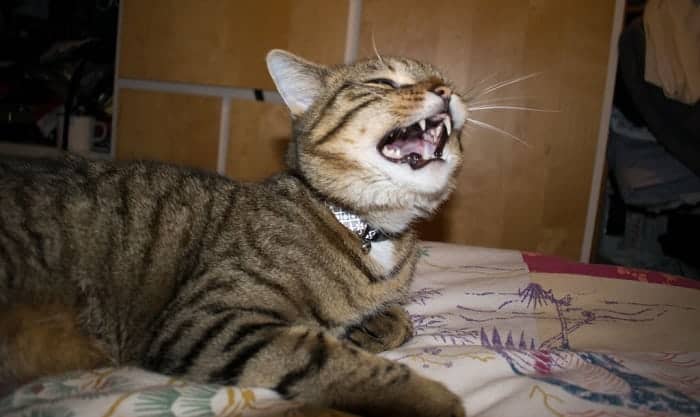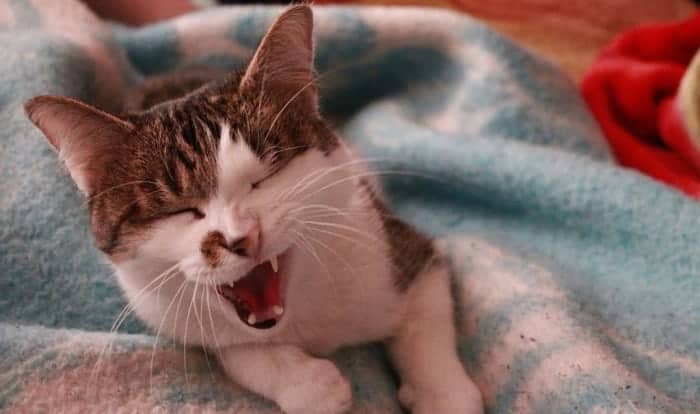For a lot of people, pets are considered to be their best friends or family members. Hence, their pets’ well-being is always a top priority. Therefore, seeing your cat sneezing so much may cause you to ask yourself: “Why is my cat sneezing a lot?”
When a new kitten is born, they are extremely sensitive to the surrounding environment. Anything that irritates them can result in your kitten sneezing a lot. People may have different opinions about a sneezing cat. Some may think it’s adorable when their cat is sneezing, but others might be worried if their cat won’t stop sneezing.
It’s good that you are well aware of your cat’s health, so I’m here to help you learn the possible causes of this phenomenon. In this article, I will introduce different reasons why your cat keeps sneezing. Here are what we will be going through:
- Respiratory Infections: There are three kinds of infections your cat may encounter: viral infection, bacteria infection, and fungal infection. Your cat might be infected with some kinds of viruses that affect his or her respiratory systems, such as herpesvirus, calicivirus, etc.
- Inflammation and Irritation: Your feline friend might catch some diseases with the inflammation and irritation symptoms, which lead to sneezing.
- Foreign materials: While playing in the yard, some blades of grass can intrude on the cat’s nose so that your cat won’t stop sneezing.
- Dental disease: This may sound strange, but teeth and nose can also be related. In addition, your cat can experience sternutation when eating food.
- Chemical irritants and allergies: Cats can be exposed to some intoxicating chemicals that trigger their noses.
- Neoplasia (Tumors): Tumors usually appear in a cat’s body if the cat is old, which can cause sternutation and be extremely painful.
- Vaccines: Being vaccinated can lead to sniffling in your cat, but your cat can recover within a few days.
Without further ado, let’s get started with the first reason: respiratory infections.
Table of Contents
Viral Respiratory Infections
Respiratory infections are a well-known cause of sneezing in cats. It is often a viral respiratory infection, bacteria infection, fungal infection, or all of them.
The dominant virus that causes this type of infection is the herpes virus since around 80 – 90% of cats around the world are diagnosed with this type of virus.
The herpes virus in humans causes some serious symptoms, such as sores on the lips, fever, or body aches. Nonetheless, the herpes virus in cats mainly causes upper respiratory signs and often goes along with sneezing, coughing, and discharge from the eyes.
Other viruses you should take notice of are calicivirus and influenza. They greatly contribute to cats sneezing, but the good news is there is protection against these viruses – the FVRCP combo vaccine. Therefore, make sure that you keep track of your cat’s vaccine record.
The next respiratory infection is bacteria infection, which is the second most common reason for the respiratory signs in cats. Whenever you see any yellow or green discharge coming out of your cat’s eyes or nose, your cat is certainly experiencing this infection.
Common culprits for this infection are often bordetella, mycoplasma, and chlamydia. These viruses are never the sole contributor to respiratory symptoms, and your cat can be cured by taking antibiotics such as doxycycline or azithromycin.
Bacteria infections usually occur following some diseases that proceed in the cat’s body. When the nasal passages are damaged by these diseases, the bacteria take the chance to get into the system as the barriers are becoming weaker.
Lastly, the respiratory infection I would like to mention is the fungal infection. It is not as widely spread as the previous two. You will need to take your cat to the vet to run a physical exam, together with rhinoscopy or a biopsy so the infection can be detected.
Respiratory infections are terrible, but they’re not the only suspect in cat sneezing. Other reasons for cat sneezing, which is less severe than respiratory infections, are inflammation and irritation.
Inflammation and Irritation
Inflammation is one part of the body’s process that protects the body from harmful agents, including viruses and bacteria. Consequently, these infections in cats can cause inflammation. When inflammation happens, it can create a feedback loop of sneezing in cats called chronic rhinitis.
Unfortunately, there is currently no appropriate diagnosis to tell whether inflammation is the main cause of sneezing in cats. We can only guess it is if the other reasons prove to not take part in the sternutation.
However, there are treatments for inflammation, such as steroid and nonsteroidal anti-inflammatory drugs (NSAIDS). In some cases, the cat may sneeze simply because you have tickled your friend or dust is stuck in their nose, which will be further explained in the following section.
Foreign Materials
When your cat is playing in the yard, some blades of grass might get in their nose. To get these external bodies out of the nasal cavity, the cat sneezes. This is necessary because if alien bodies are not removed, they can cause infections in cats.
The defense mechanism only works well if the foreign materials are small. Hence, cats may need a little help with larger objects. In this case, bring your cat to the vet for professional interruptions.
Dental Disease
It can be quite surprising to hear that teeth can play a role in sternutation. A short explanation is because the roots of teeth on the upper jaw and the nasal passages are located next to each other.
Consequently, when the teeth have some infections, the barriers between the tooth socket and the nose can be broken. Moreover, when food is consumed, it can enter the nose, thus causing a sniffle in your beloved cat. Sneezing when having dental diseases is painful for your feline friend, so I strongly advise you to take your cat to the vet for better treatment.
The next reason for sneezing in cats can be a little more dangerous because it involves toxic chemicals.
Chemical Irritants and Allergies
Whenever your cat accidentally inhales any chemical factors, such as gas or perfume, inflammation can take place in the membranes of its nose and sinuses. Therefore, sneezing is a brilliant way for cats to get rid of irritants, just like foreign materials.
Also, you might see your cat sneezing a lot if it happens to contact some allergic objects. Feline allergies are varied, but some most popular ones are pollen, grass, household cleaning products, flea, etc.
Treating allergies can be arduous because determining what your cat is allergic to is a difficult task. Hence, take your cat to the vet for some instructions on what to do.
In addition, sniffing from your beloved friend can result from tumors in his or her respiratory system, which is somewhat dangerous. The diagnosis and treatments for tumors are mentioned in detail in the following paragraph.
Neoplasia (Tumors)
Neoplasia is abnormal cells or tissues that grow uncontrollably in the body. They are called neoplasm, or simply tumors. You should be concerned if your cat is getting older as tumors usually appear in old cats. These tumors can be spotted using rhinoscopy or a nasal biopsy.
Your cat may endure much pain if there are tumors in his or her body. Remember to visit the vet annually to detect these tumors as soon as possible.
Vaccine
When your pets catch respiratory infections, it is better off to vaccinate them. Yet, intranasal vaccination can also cause sneezing in cats. Fortunately, the symptom will go away on its own after a few days, requiring no treatment.
However, if you notice strange signs on your cat, such as discharge from the nose or eyes, blood in the nose, or appetite loss, then you should take him or her to the vet for a medical examination immediately.
Read more: How much does it cost to vaccinate a cat?
Conclusion
If you have ever searched for the answers to the question of “Why is my cat sneezing a lot?”, this article is for you! I hope that after reading this article, you’ll find the right cause for this symptom and thus, take appropriate measures to tackle the issue.
What do you think about the aforementioned causes of sneezing in cats? Let me know in the comment section. If you find this article informative, please share it with your family and friends as well.

I am Amy Sawy, a Doctor of Veterinary Medicine (DVM) graduate from the University of Kansas. y husband, Dr. Plummer, and I own a veterinary clinic in Phillipsburg, Kansas. In addition to my professional background, I am a devoted pet owner myself, with a household that includes dogs, rodents, and most notably, cats – a total of five felines in my home.
In 2020, I joined an organization as a professional writer, leveraging my experience and collaborating with my team to deliver the most valuable information for your cat’s care.












